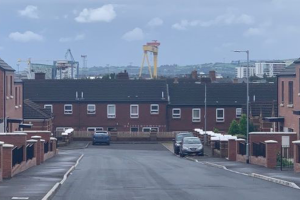
Women’s voices, particularly those from disadvantaged areas, can too often go unheard. Which is why a photobook project is now giving women from Tigers Bay and New Lodge areas of North Belfast a creative way to highlight the issues affecting them in this post-conflict city.
The photobook project was led by Shankill Women’s Centre (who are core funded by the Community Relations Council) and Ulster University.
The resulting photobook, entitled Women’s Vision in Transition, contains powerful images that explore the hard-won progress so far, as well as the steps still necessary to be taken to achieve a peaceful society for all.
Eileen Weir, network co-ordinator at Shankill Women's Centre, believes this project can unite women from interface areas while also highlighting the social and economic issues still prevalent within those areas, issues which have persisted in the two decades since the signing of the Good Friday Agreement.
Women’s Vision in Transition is the follow-up to the 2015 photobook Women’s Vision from Across the Barricades. That original photobook now forms part of a prestigious collection in Belfast’s Linen Hall Library and the Tate Library in London.
“Our first photobook was an attempt to bring women together from interface areas to create common goals for what they’d like to see happen within their areas,” Eileen said, “especially around issues such as housing, education, employment and women’s services.
“With this new book, Women’s Vision in Transition, we wanted to highlight ordinary women who are trying to improve their community and who do not have their voices heard,” Eileen explained. “That is my job – to get women’s voices heard. I believe we achieved that as a collective, and both of these photobooks speak for themselves.”
The original book was used as a lobbing tool to highlight the experiences of women in those areas of North Belfast, as well as a tangible way of shining a light on their important issues.
“The women used the photobook as a lobbying tool to help achieve their aims. We gave the photobook to local politicians and members of the legislative assembly,” Eileen said. “It was a tangible way of showing politicians that this is what women are saying, this is what grassroots communities are saying.”
When Eileen presented Women’s Vision from Across the Barricades to Northern Ireland’s First Minister, Arlene Foster, she had a special message:
“I gave it to her, and I put ‘trust women’ on the front of it.”
Women’s Vision in Transition – due to be launched at an exhibition which was subsequently cancelled due to the Covid-19 pandemic – has now been launched online. The book contains before and after photos showing which of the desired outcomes of the original project have been achieved in the interim half decade since publication, as well as those outcomes which have been yet to be realised.
Dr Jolene Mairs Dyer, Ulster University, said: “There is a feeling that communities most affected by conflict have yet to directly benefit from the dividends of peace. We call it ‘in transition’ because there’s still a bit of work to do.
“There were a lot of houses that were dilapidated or sitting unused, and there are now new builds. We can't say that that was directly because of this project, but what we did was create a sense of shared goals and objectives on socio-economic terms, rather than Protestant, Catholic, Nationalist, Republican, etc.”
Empowering women is crucial to helping these communities find a voice to articulate the changes they feel are necessary to build a stronger and more lasting peace for all.
Eileen said: “It was a pleasure working with groups from grassroots level and in making working-class women’s voices heard, because these voices are absent from local power structures and decision-making forums.”